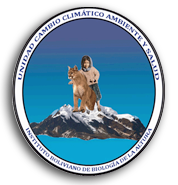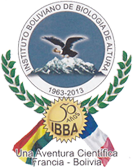The 21th Century is the setting as consequences from extractive development intensive using of fossil fuels and inequitable. These global environmental changes are products experienced, forming "societies at risk" because these are presented in a turning point at a rate that exceeds natural processes of adaptation and forcing pressures deepen gaps extreme inequality and deterioration for human life and its environment.
The States structure, the success of "development", modernity and social behaviour "postmodern" accelerated processes of environmental degradation and disrupt the global climate system, overcoming vulnerability in their physical, social, economic and environmental dimensions. Therefore, decisions at the international level will have their effect on the consequences in different countries. International policies to stabilize the climate system are challenging to achieve significant reductions of greenhouse gases especially within their countries.
"Global warming is unequivocal, as evidenced from the observed changes in global average temperature and ocean, glacial retreat and increase sea level" "The relationship between climate change and development is mutual influence: climate change threatens sustainable development and increase exposure to extreme event emerging; while development generates changes in global concentrations of greenhouse gases by breaking the energy balance of the Earth, socially constructed vulnerability and encounters represents displaced populations, destroyed infrastructure, production losses, increased poverty, loss of opportunities and inequality "
The Plurinational State of Bolivia is among the countries with high levels of food insecurity because many of the rural population's main income sources have agriculture and livestock in the poorest municipalities the production characteristic is to home consumption: where reductions in its production strongly affect food availability. The impact of climate change on food production is evident from the reduction of cultivated areas in certain crops and successive losses due to more intense extreme weather events and chronic changes that cause the loss of food production potential.
Human health is affected directly and indirectly by climate change and natural climate variability. The direct effects are mainly related to the "extreme events" where there is direct damage induced by its occurrence, diarrheal diseases associated with floods, droughts, heat waves recent international level has meant large-scale casualties. In addition, as indirect effects, it has its impact on "determinants of health", with more complex health situation, particularly that concerning climate-sensitive diseases, are these: endemic, emerging, re-emerging or new. Often the outbreak of malaria, dengue, Chucungunia, acute diarrheal diseases are permanent vulnerable urban and rural populations where health services do not cover the needs of the population threat.
Impacts of Climate Change on Water Resources, are responsible for changes in the hydrological cycle, leading to excess or deficit of precipitation with abnormal temporal distribution, affecting the availability of water in different regions of the country; this product is recorded more frequently intense droughts, even without the presence of ENSO events. In other to, they are lost annually important snow masses in high mountain glaciers due increase temperatures experiencing a kick out of them. This process increases the flow in rivers during the rainy season and contrary accentuates the decrease flows in the dry season, a factor that significantly affect the availability of water for consumption and settlement are likely to be affected hydro power plants in the future. However, improper use of water resources increase the lack of existing water and it is necessary that the sectors that generate wastewater in the industrial, energy and mining sectors make water treatment; actions that allow reuse thereof.
Ecosystems are altered by changes in temperature and precipitation regimes incremental greenhouse product; they have alterations in the distribution and composition of ecosystems, involving biodiversity loss and the economic value of forests. Additionally, the human pressure on forest resources accelerate the processes of degradation of ecosystems more. These impacts, leading to a series of problems result from an imbalance of the harmony of its components.
Los ecosistemas se ven alterados por cambios en la temperatura y los regímenes de precipitación producto del efecto invernadero incremental, presentan alteraciones en la distribución y composición de los ecosistemas, implicando pérdida de la diversidad genética y el valor económico de los bosques. Adicionalmente, las presiones antrópicas sobre los recursos forestales aceleran más los procesos de degradación de los ecosistemas. Estos impactos, dan lugar a una serie de problemas resultado de un desequilibrio de la armonía de sus componentes.
Natural systems suffer accelerated degradation processes due to sudden changes in weather patterns, focusing on the reduction of natural carbon sinks and producing emissions of greenhouse gases by decomposition of biomass, which affects the ability to provide functions various environmental. The species adaptation process and ecosystems are dynamic. However, climate change and the processes of interaction of the components of the climate system to changes in atmospheric composition are given in much shorter than those observed in geological time periods, they do not give rise to coping mechanisms natural (resilience) can respond at the same rate, so many species are constantly threatened with extinction. The conversion of forests and grasslands is an important contributor to national emissions of greenhouse gases. Additionally, it also contributes to increased vulnerability habitat fragmentation, loss of forest cover and degradation of other vegetation in different ecosystems.
Since climate change unit environment and health of the Bolivian Institute of biology height is intended to give a space to the documents produced by the National Climate Change Program. For these reasons, particularly the social vulnerability and health vulnerability, it has multifactorial origin and responds to many factors, including social, environmental, economic, political and cultural rights, overcoming the traditional epidemiological approach to identify health outcomes. In addition, subsequent changes in climate change and variability social biological transmission, ecological, political, and economic (migration, income, sanitation, malnutrition, etc.), produce epidemiological changes that modify the behaviour, presentation and extension geographical and altitudinal climate sensitive diseases.
Mission
Climate Change, Environment and Health Unit We are an interdisciplinary team of researchers with an ecohealth approach, committed to the generation of new knowledge on climate change and environmental health in height; promotion and bioclimatic monitoring to contribute to the definition of comprehensive public health policies aimed at improve the quality of life of the Bolivian population. Accordingly, the institutional goals of the Bolivian Institute of Biology of the height of the Faculty of Medicine of the Universidad Mayor de San Andrés, and under the National Development Plan.
Visión
Climate Change, Environment and Health Unit We will be the leading group in providing relevant scientific information from the integrated approach and eco-health, for application in national policies for adaptation and resilience to climate change. This developed in according to the highest standards of innovation, ethics, excellence, inter-sectorial and transdisciplinary health, maintaining a high institutional commitment and social interaction at all times contributing to the welfare and quality of life of Bolivian society.












